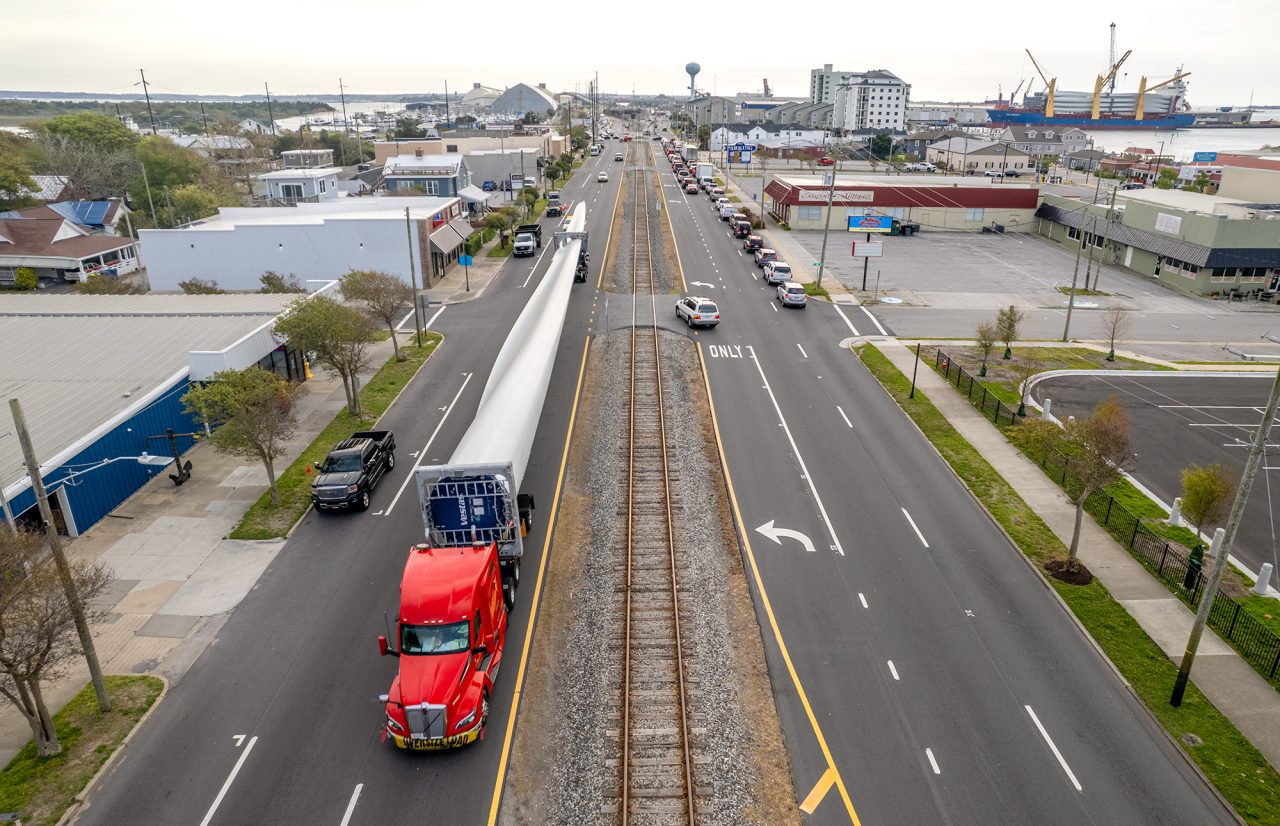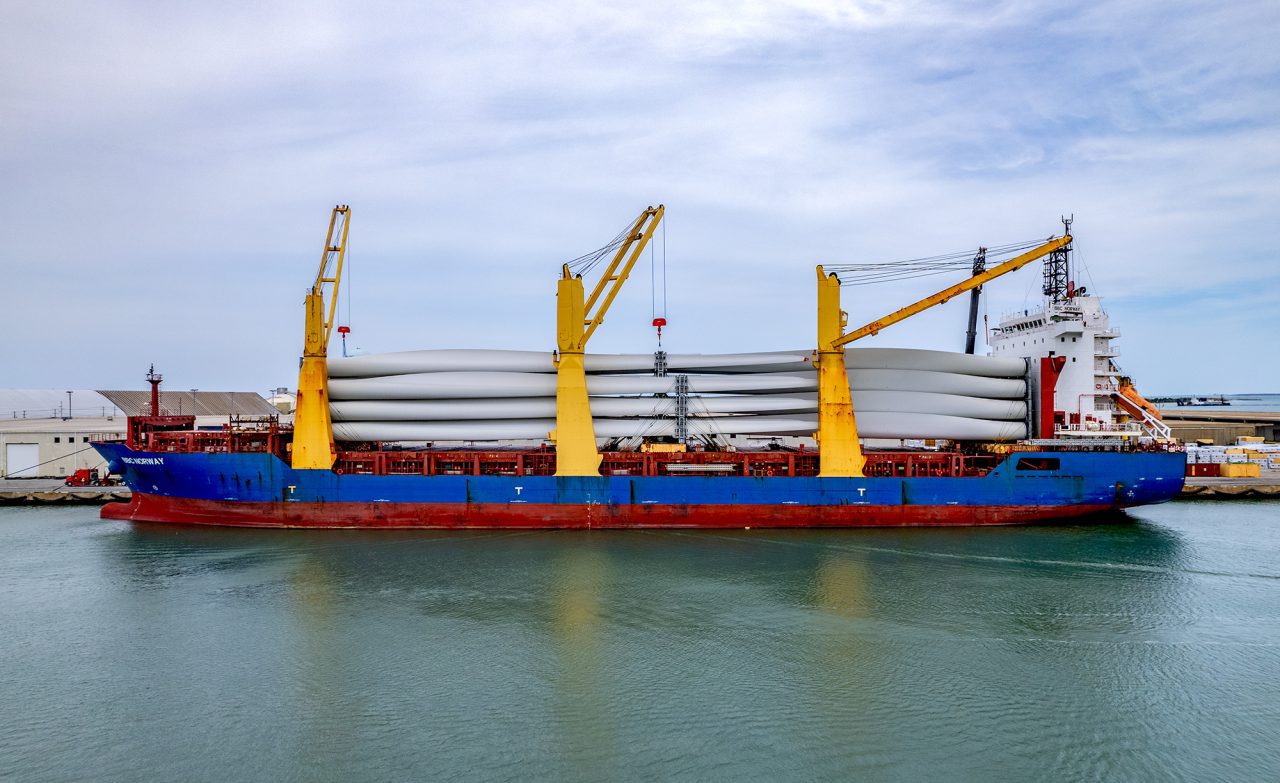
Those white blades the length of a city block that have been at the North Carolina Port at Morehead City the last few weeks are destined for great heights.
Vestas, a wind turbine company based in Portland, Oregon, manufactured the onshore wind turbine components, which arrived in mid-March from India on cargo ships, including the 528-foot-long BBC Norway and 529-foot-long Basilisk, at the state’s deep-water port in Carteret County.
Supporter Spotlight
The 242-foot-long blades are for the roughly 6,300-acre Timbermill Wind, a 45-turbine energy facility currently under construction in rural Chowan County near Edenton. Timbermill Wind is a project of Apex Clean Energy in Charlottesville, Virginia.
Apex Senior Community Relations Manager Natasha Montague explained Wednesday that turbine components for the project are being delivered from Morehead City to the Riverbulk barge terminal outside of Edenton on the Chowan River. From there, they will then be transported to the wind energy facility site off Bear Swamp Road, north of Edenton.
The turbine installation is to start this summer, and the project is on track to start commercial operations in early 2025, Montague said. “Construction is well underway, with over 150 workers on site.”
The Chowan County location was chosen because it’s a verified wind resource, has existing onsite transmission lines and roads, expansive rural timber and agricultural lands, and it avoids sensitive military and environmental areas, according to Apex.
“The 45 wind turbines at Timbermill Wind will be capable of producing up to 189 (megawatts) of clean, homegrown energy, enough energy to power up to 47,000 homes every year,” Montague said.
Supporter Spotlight
There are monthly construction updates on the Timbermill website, she added. Recently, workers have been readying for the turbines to be delivered.
Timbermill Wind is expected to produce more than $80 million in direct economic benefits over the project’s 30-year lifetime, plus dependable long-term revenue for local farmers and landowners, Montague added. “Approximately $33 million will be paid in taxes to Chowan County taxing districts, making the project Chowan County’s largest taxpayer.”
Southern Alliance for Clean Energy Climate Advocacy Director Chris Carnevale explained to Coastal Review that wind energy is an important resource to use so “we all can have a reliable, low-cost, and environmentally responsible electricity system.”
Carnevale added that wind energy has a key role to play in a diverse portfolio of clean energy resources for providing reliable power 24/7.
“While we in the Southeast have mostly focused offshore for wind energy potential in our region, modern technology has made land-based wind energy, like the Timbermill project, a valuable opportunity that we should be taking advantage of,” Carnevale said. “Land-based wind farms, like Timbermill, not only provide reliable, low-cost power, but also serve as major sources of economic development and funding for rural communities and local residents.”

The North Carolina Department of Environmental Quality’s Division of Energy, Mineral, and Land Resources issued the permit for the onshore wind energy facility to Apex in March 2023. State officials said this permit is the first for a facility under a state law passed in 2013 that establishes a permitting program for wind energy facilities.
“Timbermill Wind has been a project of many ‘firsts’, and that’s a big deal. This project was the first in the state to receive approval from state regulators, which has helped to pave the way for future projects,” Southeastern Wind Coalition Program and Outreach Manager Karly Lohan said.
“Timbermill Wind is also the first project in North Carolina that achieved 40% domestic content for its manufactured components, allowing it to qualify for the 10% domestic content adder through the Inflation Reduction Act,” Lohan added. “This is just another example of how land-based wind development can invigorate North Carolina’s manufacturing supply chain and support economic growth across the entire state.”
In August, Apex and Google announced a power purchase agreement for the full 189-megawatt capacity of Timbermill Wind. This commitment, according to the announcement, is to support “Google’s 2030 commitment to powering its operations with carbon-free energy around the clock.”
Currently, North Carolina only has one commercial-grade onshore wind farm in operation: the 104-turbine Amazon Wind Farm U.S. East, powered by Avangrid Renewables, near Elizabeth City. The 208 MW facility, which has more than 500 workers, began delivering power in December 2016, and generates enough energy to power the equivalent of about 61,000 U.S. homes per year.
The Department of Energy has recognized the advantages and disadvantages of wind power.
Benefits are that the industry creates good-paying jobs, wind is a domestic resource that enables economic growth, benefits local communities, and is affordable, clean and renewable.
The challenges include competing with other low-cost energy sources, connecting the energy from the wind facility sites to where it’s needed, turbine noise and appearance, and impacts on wildlife.
According to a Global Wind Energy Council study released Tuesday, the United States is one of the top five markets for new wind installations, along with China, Brazil, Germany and India.
Worldwide, the wind industry has installed what the council said is a “record 117 GW of new capacity in 2023.” The council is a member-based organization made up of companies, organizations and institutions across 80 counties.
“New installations in the onshore wind market passed the milestone of 100 GW while new offshore wind capacity commissioned last year reached nearly 11 GW, making 2023 the highest and the second-highest year in history for new wind installations for onshore and offshore, respectively,” states the Global Wind Report 2024. “116.6 GW of new wind power capacity was added to the power grid worldwide in 2023, 50% more than in 2022, bringing total installed wind capacity to 1,021 GW, a growth of 13% compared with last year.”
Currently, there are 16 active primary wind manufacturing plants in 12 states, and 450 wind-related manufacturing facilities in the United States supporting more than 20,000 manufacturing jobs.
Since the Inflation Reduction Act became law in August 2022, 123 new manufacturing facilities or facility expansions have been announced, the report states. This includes 12 onshore wind power manufacturing facilities, nine offshore wind facilities, 78 solar facilities, 20 grid-scale battery storage facilities or facility expansions and four grid connection facilities.
“From this total, 44 facilities have either completed or are currently under construction. Once all in operation, these 120+ facilities will support nearly 42,000 new manufacturing jobs.”







